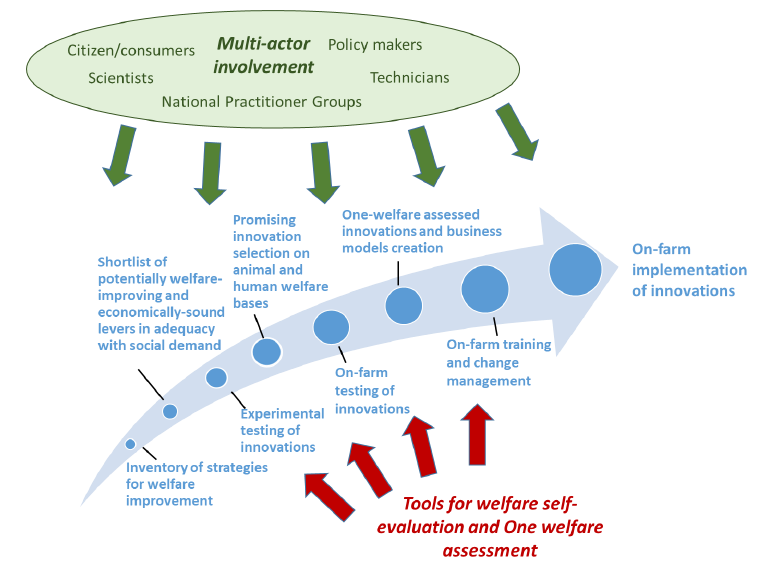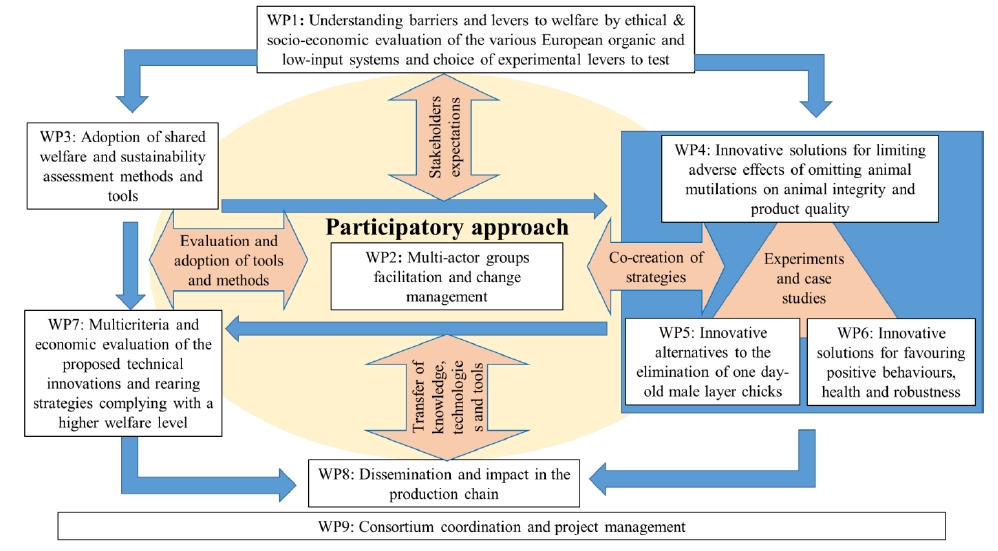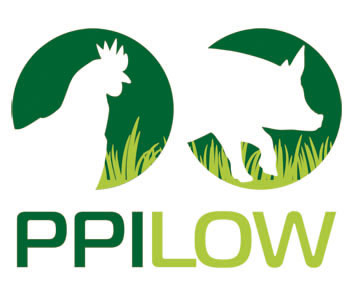Context
The sustainability of animal production depends on economic, environmental and social criteria, a sustainable system being “acceptable now and its expected future effects should be acceptable, in particular in relation to resource availability, consequences of functioning and morality of action (Broom, 2001). It can only be achieved if it integrates animal welfare and the well-being of producers and consumers, the two latter components being highly dependent on the first item (‘One Welfare’ concept, Pinillos et al., 2015).
Among domestic animal species, laying hens, followed by broilers and pigs are the species or strains for which rearing conditions in the EU are judged to need the highest improvement in terms of welfare. The consumers’ perception and knowledge of animal welfare varies depending on European countries (Special Eurobarometer 442, Attitudes of Europeans towards Animal Welfare, 2016). However, a strong preference is given by consumers to attributes concerning naturalness, considering the availability of space, freedom to express natural behaviours, especially through the use of outdoor areas. For poultry and pigs, outdoor access indeed contributes to greater expression of natural behaviour, such as foraging, the access to fibrous feeding resources, the reduction of animal density in farm buildings, of feather pecking and aggressiveness. Consumers show an increasing demand for fresh and processed pigs and poultry meat and eggs originating in organic and low-input outdoor production systems. Nevertheless, there are still several challenging questions unsolved concerning the organic and outdoor low-input productions, and especially in relation to animal health and mortality problems (Prunier et al., 2014; Rangstrup-Christensen, 2017).
Besides, European citizens expect guarantees about improved animal welfare, safety and quality of poultry and pork meats as well as eggs in these systems (Castellini and Dal Bosco, 2017; Parrott and Walley, 2017). Indeed, recent studies showed that the organic buyer is more and more sensitive to tangible attributes but also intangible attributes of organic meat (McEachern and Schröder, 2002). Consumers and practitioners of these production systems particularly disapprove of damage to animal integrity (i.e. beak trimming, piglet castration) and of the killing of one-day old male layer chicks, representing 420 millions of chicks per year in Europe for all production systems (Galli et al., 2016). These practices question the ethics and the sustainability of these types of productions as well as of more intensive ones. There is therefore a need to improve pig and poultry welfare and adaptive capacities in organic and low-input outdoor systems (EU Recommendations https://ec.europa.eu/food/animals/welfare/practice/farm) while gaining in feed efficiency for reducing production costs and environmental outputs.
The great challenge to improve welfare in poultry and pig organic and low-input outdoor production systems can be tackled by i) reinforcing robustness, control of infectious disease and especially parasites with low amounts or no veterinary drugs, ii) avoiding mutilations, such as piglet castration and beak trimming in hens, as well as iii) avoiding injuries, like pig and broiler lameness or feather pecking in laying hens and broilers, and the killing of day-old male layer chicks, while considering the diversity of EU systems, practices and needs.
Objectives
The PPILOW project aims to co-construct through a multi-actor approach solutions to improve the welfare of poultry and pigs reared in organic and low-input outdoor production systems. The project will target non-conventional and outdoor rearing systems with reduced (notably drug) inputs and organic systems (as defined by EU Reg. 834/07, so considering defined rearing conditions, organic and local feed use and preventative approaches to health management with limited use of chemical inputs).
Therefore, the PPILOW project has the ambition to:
- Identify existing barriers for increasing welfare of organic and low-input outdoor-reared poultry and pigs and take an inventory of the farming practices that will be considered in ii) and iii) according to stakeholders’ and citizens’ expectations and priorities (Work package WP1).
- Co-create, with end-users involved in National Practitioners Groups (NPG), innovative breeding and rearing strategies and techniques for improving the welfare of animals by avoiding mutilations (such as piglet castration or beak trimming in poultry), the elimination of one day-old layer male chicks, favouring positive behaviours, and improving health, robustness (i.e. ability to maintain performance despite the occurrence of perturbations) and resilience (i.e. ability to absorb change and to anticipate future perturbations through adaptive capacity) in pigs and poultry (WP2).
- Build, test, share and adopt self-assessment tools that allow trained farmers and technicians to monitor the animal welfare on-farm in order to identify critical periods and to ensure corrective welfare management practices by production actors (WP3).
- Test experimentally and on-farm the potential of the innovations identified in 1, 2 and 3 through the participatory involvement of practitioners, technicians and scientists (WP4-5-6).
- Realise multi-criteria analyses of the most promising breeding and rearing strategies to evaluate their economic, social and environmental impacts according to the ‘One Welfare’ concept and build associated business models (WP7).
- Ensure the uptake of the project results by end-users by appropriate dissemination activities (trainings, EIP practice abstracts…; WP8) and the close involvement of National Practitioner Groups (NPGs) to facilitate change (WP2).
Description of tasks
The WP1 "Understanding barriers and levers to welfare by ethical & socio-economic evaluation of the various European organic and low-input systems in their diversity and choice of experimental levers to test" (led by Jarkko Niemi-LUKE, Finland) aims to develop an inventory of animal welfare practices in organic and low-input outdoor poultry and pig production systems, identify the perception of stakeholders regarding welfare in these systems and the production practices currently employed and evaluate the reactions of the general public and farming sector to new approaches to pig and poultry production. All these tasks will be conducted thanks to interactions with production chain actors, other stakeholders and citizens. It will finally provide a shortlist of measures to be studied in experimental WPs (WP4 to 6) that can lead to improvements in animal welfare and add economic value or environmental benefit.
The PPILOW participatory approach will be sustained within the project through the actions of WP2 "Multi-actor group facilitation and change management" (led by Cristina Micheloni, AIAB, Italy). The WP2 aims to guide the process of change management towards more animal welfare within groups, at national and European levels, by stimulating an environment of exchange among farmers, business actors, researchers and advisers. WP2 will set up local group management (National Practitioner Groups-NPG) and organize their interactions through facilitators for each group at the European level. Supporting methodology to train facilitators will be developed and implemented to guide the group to change management and evaluation methods. This will ensure the stakeholders engagement in the different WPs to co-create, test, validate the project outputs and disseminate them ensuring sustainable welfare improvements. Crosswise participatory focus groups (WP1) and national practitioner groups (WP2) will be involved from the beginning of the project in each participating country as representative of European diversity.
PPILOW experimental strategy will be standardized by adopting sustainability assessment tools according to the ‘One Welfare’ concept. Therefore, the WP3 "Adoption of shared welfare and sustainability assessment methods and tools" (led by Frank Tuyttens- EV ILVO, Belgium) aims to build up shared self-assessment tools for welfare and sustainability evaluations within species (pigs and poultry) and production chains. It will be based on protocols and evaluation grids based on previous projects in order to develop or adopt practical tools later used in experimental and case-study WPs (4-5-6) to evaluate welfare, especially for on-farm evaluation. Tools will also be built for the One Welfare multi-criteria assessment of the tested strategies in WP7 in close collaboration with the NPG’s (WP2). WP3 will propose shared methodology for economic evaluation of the most performing solutions and the associated business models to be used in WP7. The levers of welfare improvements addressing the issues related to avoiding animal mutilations, stopping the killing of day-old layer male chicks and favouring positive behaviours and robustness will be experimentally tested and validated in case studies throughout experimental WPs 4, 5 and 6, respectively.
The WP4 "Innovative solutions for limiting adverse effects of omitting animal mutilations on animal integrity and product quality" (led by Bas Rodenburg-UU, The Netherlands) will focus on the challenge of keeping laying hens and fattening pigs in organic and low-input systems without applying mutilations, such as beak trimming in laying hens and castration in pigs. WP4 will test incubation and early-life strategies including insect feeding, in laying hens that result in resilient birds and minimize feather pecking and cannibalism. It will optimise design for the outdoor area for laying hens that maximises the use of the outdoor area and minimises feather pecking, feather damage and mortality. Strategies will also be elaborated to prevent undesired behaviours in intact male pigs (mounting, aggression) and to avoid boar-taint in the end-product. The WP5 "Innovative alternatives to the elimination of one day-old male layer chicks" (led by Antoine Roinsard-ACTA/ITAB, France), aims to work on innovative alternatives to the elimination of day old male layer chicks by developing dual-purpose crossbreeds and non-invasive in ovo sexing method for the early selection of eggs. WP5 will evaluate the characteristics of different dual-purpose genotypes with regard to productivity, behaviour on outdoor area, health and production cost and evaluate Genotype × Environment interaction for these genotypes. It will also develop innovative methods for in ovo sexing. Finally, the WP6 "Innovative solutions for favouring positive behaviours, health and robustness" (led by Sanna Steenfeldt-Aarhus, Denmark) aims to develop solutions that favour adaptation to organic and outdoor systems for laying hens, slow-growing broilers and pigs. The goal is to improve health, robustness and welfare and decrease mortality through appropriate feed, management and housing in interaction with their genetic background. WP6 will notably provide an adaptability index for different genetic strains and identify early predictive indicators of later exploration capacities in broilers.
The experimental WPs will complement each other for the ethical use of animals ensuring the project efficiency and spread of the obtained knowledge among partners. The ‘One Welfare’ assessment of such realized strategies and the construction of related business models will be carried out in WP7 "Multi-criteria and economic evaluation of the proposed technical innovations and rearing strategies complying with a higher welfare level" (led by Petra Thobe-Thuenen, Germany). It aims to perform a multi-criteria (economic, social, environmental) evaluation of the innovations identified in the previous WPs. WP7 will evaluate the different strategies analysed in WP4 to 6 for each type of production (broilers, laying hens, pigs), using criteria and indicators defined in WP3 and used in case studies. WP7 will also build business and economic models for the most promising and acceptable solutions in order to identify the economic viability and feasibility of the proposed strategies.
The WP8 "Dissemination and impact in the production chain" (led by Andrea Rosati-EAAP, Italy), aims to disseminate project’s information and results widely at scientific, food chain, general public and political levels by creating and maintaining a maximal interaction with the different stakeholders. It will guarantee PPILOW’s maximal impact in the nine partner countries but also in the whole of Europe, developing and updating a detailed dissemination and exploitation plan, creating a pan-European network that will include the participatory networks built in WP2. This impact will be enabled thanks to digital communication tools, training sessions, national and European events, communication campaign, social networks, interaction with European stakeholders, interactions with EIP-AGRI Platform and on-going H2020 projects as well as scientific communications at congresses during the PPILOW final conference and through publications.
Finally, The WP9 "Consortium coordination and project management" (led by Anne Collin-INRA, France) will ensure the proper management of the project at the strategic, operational and organisational levels and the implementation of the project according to the work plan and the consortium agreement (CA). WP9 will undertake scientific coordination, financial control, quality monitoring, and risk analysis. It will prepare financial statements and consolidate scientific reports, and will ensure administrative management that conform to the EC rules. WP9 will also establish the data management plan describing the data management policy adopted within the project for all the datasets produced by the project. The CA, to be signed at the project start, will define the rules for Intellectual Property (IP) management within the PPILOW consortium.
The CRA-W will participate in WP 1, 2, 3 and 8 on tasks linked to the pig sector.
Contribution
The CRA-W will participate in WP 1, 2, 3 and 8 on tasks linked to the pig sector.
Partners
Consortium :
|
Institution |
Involvement |
|
UU – Universiteit Utrecht – Netherlands |
WP4 leader |
|
AU - Aarhus Universitet - Danmark |
WP6 leader, WP1, WP2, WP3, WP7 and WP8 |
|
ACTA - France |
WP5 leader, WP8, WP3, WP2 and WP4 |
|
EV ILVO - Belgium |
WP3 leader, WP1, WP2, WP4, WP7 and WP8 |
|
AIAB - Italy |
WP2 leader, WP1 and WP8 |
|
LUKE - Finland |
WP1 leader, WP7 and WP8 |
|
Thuenen Institut - Germany |
WP7 leader, WP1, WP3, WP5 and WP8 |
|
EAAP - Italy |
WP8 leader, WP1 |
|
WU - Wageningen University – Netherlands |
WP1, WP2, WP4, WP6 and WP8 |
|
UNIPG - Italy |
WP1, WP2, WP3, WP6, WP7 and WP8 |
|
SYSAAF - France |
WP1 , WP2, WP5, WP6 and WP8 |
|
CRAW - Belgium |
WP1, WP2, WP3 and WP8 |
|
FEXP - Danmark |
WP2, WP6 and WP8 |
|
BioForum - Belgium |
WP1, WP2, WP3 and WP8 |
|
HAU- UK |
WP1, WP2 and WP8 |
|
SlowFood - Italy |
WP1, WP2 and WP8 |
|
ISEN - France |
WP1, WP2, WP6 and WP8 |
|
CNRS - France |
WP1, WP2, WP5, WP7 and WP8 |
|
USAMV - France |
WP1, WP2, WP6 and WP8 |
|
Vanggaard - Danmark |
WP1, WP2, WP6 and WP8 |
|
Millibeter - Belgium |
WP1, WP2, WP4 and WP8 |
|
IT - INRA Transfert - France |
WP8 and WP9 |
CRAW off coordinator
Anne Collin - INRA, FranceFunding
- CE - DG Research - Horizon 2020





